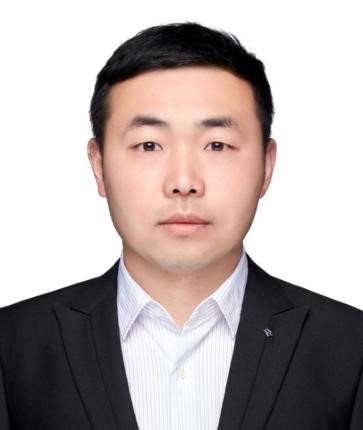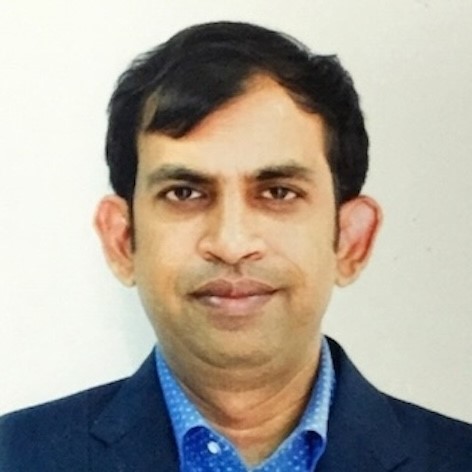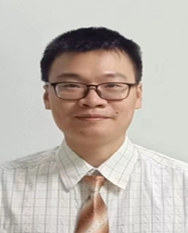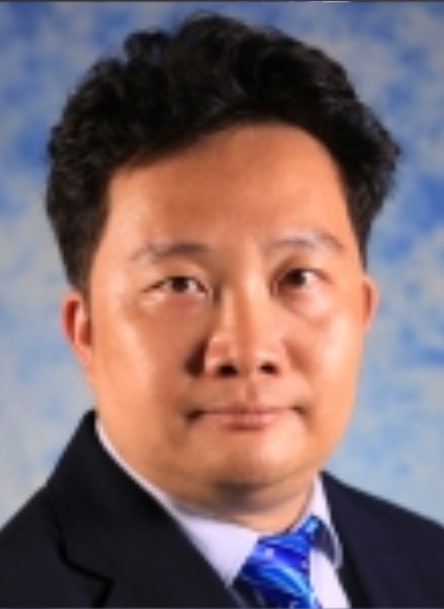
Dr. Bingshu Wang
Northwestern Polytechnical University, China
Speech Title: Towards Efficient, Accurate and Lightweight Infrared Small Target Detector
Abstract: In recent years, the detection
of infrared small targets using deep learning methods has
garnered substantial attention due to notable advancements.
To improve the detection capability of small targets, these
methods commonly maintain a pathway that preserves
high-resolution (HR) features of sparse and tiny targets.
However, it can result in redundant and expensive
computations. To tackle this challenge, we propose a sparse
infrared-target detector (SpirDet) for the efficient
detection of infrared small targets. Specifically, to cope
with the computational redundancy issue, we employ a new
dual-branch sparse decoder (DBSD) to restore the feature
map. First, the fast branch directly predicts a sparse map
indicating potential smalltarget locations. Second, the slow
branch conducts fine-grained adjustments at the positions
indicated by the sparse map. In addition, we design a
lightweight DO-RepEncoder based on reparameterization with
the downsampling orthogonality (DO), which can effectively
reduce memory consumption and inference
latency. Extensive experiments show that the proposed
SpirDet significantly outperforms state-of-the-art (SOTA)
models while achieving faster inference speed and fewer
parameters. For example, on the NUDT-SIRST dataset, SpirDet
improves mean intersection over union (MIoU) by 2.09 and has
a 3.1× frames/s acceleration compared to the previous SOTA
model. The code is available at
https://github.com/laCorse/SpirDet-Pytorch.
Bingshu Wang is an Associate Professor from the School of Software, Northwestern Polytechnical University. He received his Ph.D. in computer science from University of Macau in 2020. He is also an member of Chinese Association of Automation (CAA), China Computer Federation (CCF), Chinese Association for Artificial Intelligence(CAAI). He serves as reviewer for AAAI, CVPR, ICME, IJCAI, ICASSP, IET Image Processing, IEEE Transactions on Artificial Intelligence, IEEE Transactions on Cybernetics, Computers and Electronics in Agriculture. His current research interests include digital image processing, machine learning, drone vision, and Artificial Intelligence. He has published more than 40+ papers in the important conferences or journals in the field of digital image processing, multimedia, artificial intelligence, etc. He won the best paper award in the 2024 China University Computer Education Conference (CECC 2024). He won the excellent supervisor prize in 2023, and the first prize in 2022 for Teaching and Research Prize from Northwestern Polytechnical University.

Dr. Sajjad Hussain Chauhdary
Huzhou Normal University, China
Speech Title: Navigating the AI-Cybersecurity Landscape:
Opportunities and Risks
Abstract: Artificial Intelligence has emerged as an
essential resource for cybersecurity, which enables
exceptional solutions for “threat detection”, “incident
response” and “vulnerability assessments”.
However, the interoperability of AI with cybersecurity
systems raises serious challenges. These challenges include
“technological limits”, “ethical considerations”, and
“adversarial threats”.
The technological limitations or challenges includes the
lack of quantitative, high-quality datasets, the
interpretability by AI models, and the possibilities of
adversarial attacks may manipulate AI systems. Ethical
considerations or concerns raise questions about privacy,
bias, and responsibility, as AI-powered systems may
unintentionally perpetuate existing social biases or make
decisions with unintended consequences. Adversarial threats
pose significant concerns because hostile actors can exploit
AI system potential to launch large scale assaults to
breakdown digital infrastructures of a country or even
globally. To overcome these difficulties, a comprehensive
“AI powered Cybersecurity “strategy is required, which
includes thorough research and development, rigorous “AI
enabled Cybersecurity” frameworks, and ethical standards.
By proactively tackling these concerns, we may fully realize
AI's potential for improving cybersecurity and safeguarding
digital systems.
Sajjad Hussain Chaudhary is currently an Associate Professor
at the College of Information Engineering, Huzhou Normal
University. Prior to his current role, he served as an
Associate Professor at the College of Computer Science and
Engineering (CCSE), University of Jeddah from September 2016
to September 2024.
Before entering academia, Dr. Chaudhary held the position of
Senior Research Engineer at LG/LSIS Co., Ltd., Advance
Technology R&D Center in 2011. During his tenure, he was
recognized with the "Best Research Award" (2012) and the
"Best Project Award" (2014).
Dr. Chaudhary earned his Ph.D. degree from Korea University,
ranked 69th in the QS World University Rankings 2021. He was
awarded a scholarship by the Korean Government to pursue his
doctoral studies. In 2006, he obtained his M.S. degree from
Ajou University, South Korea.
With a strong research focus on Cybersecurity, Industrial
Internet of Things, and Communication, Dr. Chaudhary has
authored over 40 publications in international journals and
conferences.
Throughout his career, Dr. Chaudhary has been actively
involved in standardization efforts, serving as a member of
major organizations such as SAE International (standard
J2847/1-5), ZigBee Alliance (SEP 2.0), and ISO/IEC (15118).

Dr. Haozhi Huang
Macau University of Science and Technology, China
Speech Title: Object Tracking in autonomous driving: Past,
Present and Future
Abstract: Object tracking is one of the fundamental tasks in
computer vision, and it is essential to a robust autonomous
driving system. Human drivers analyze the surrounding
environment of the vehicle to anticipate the occurrence of
danger and take corresponding measures in advance. However,
referencing the occurrence of danger is challenging. It
requires a model to analyze a time series sequence of
observing data from different types of sensers. Object
tracking is the key to extract motion sequences from
different objects, as it estimating their trajectories
simultaneously. We will provide a comprehensive summary of
the evolution of object tracking technology, offering an
in-depth analysis of the current state-of-the-art tracking
frameworks, encompassing both deep learning-based and
traditional, non-deep learning approaches.
Haozhi Huang, received his M.Sc and Ph.D. degree from Macau University of Science and Technology, Macau, China, in 2015 and 2020, respectively. He is now an assistant professor at the school of Intelligent Systems Science and Engineering, Jinan University, Zhuhai, China. His current research interests include computer vision for 3D visions of point cloud processing, person re-identification and object recognition and tracking. He is also study the data mining problems in traditional Chinese medicine prescriptions using knowledge graph and self-organizing map during his postdoctoral period in Zhuhai Fudan Innovation Institute and Fudan University.

Dr. Zhiyao Liang
Macau University of Science and Technology, China
Speech Title: Advancing Chinese Traditional Medicine with
AI: Multi-Modal Innovations and Literary Insights
Abstract: Chinese Traditional Medicine (CTM) represents a
rich tapestry of diagnostic practices, herbal knowledge, and
literary traditions. The AI era provides exciting
opportunities to advance the study of CTM.
This presentation explores how AI can enhance CTM practices,
combining multi-modal capabilities with the rich insights
embedded in CTM texts. Multi-modal AI systems can digitize
and optimize the four diagnostic methods—望 (observing), 闻
(listening), 问 (inquiring), and 切 (palpating)—through
innovations like computer vision for tongue and facial
analysis, natural language processing for understanding
patient narratives, and sensor technologies for pulse
detection. These technologies provide precision while
honoring CTM's holistic approach.
Equally vital is the role of AI in managing and discovering
insights from CTM literature. By processing centuries of
written texts, AI can uncover hidden patterns, improve
access to herbal formulations, and facilitate
cross-referencing between traditional and modern medical
knowledge. Challenges such as precise language
understanding, preserving cultural authenticity, managing
data complexity, and ensuring ethical AI applications will
also be addressed.
This talk highlights the synergy between tradition and
innovation, bridging the power of AI to the needs of CTM
study and illustrating how AI can unlock the potential of
CTM while safeguarding its legacy for future generations.
Zhiyao Liang is an Assistant Professor at the School of Computer Science and Engineering, Macau University of Science and Technology, in Macau SAR. Dr. Liang obtained his Master’s and Ph.D. degrees in Computer Science in the USA from The University of Texas at Austin and the University of Houston. He is involved in research topics on AI and language-related computations.
Speakers in 2025 to be announced soon......
© 2020-2025 6th International Conference on Computers and Artificial Intelligence Technologies--cait_conference@163.com.